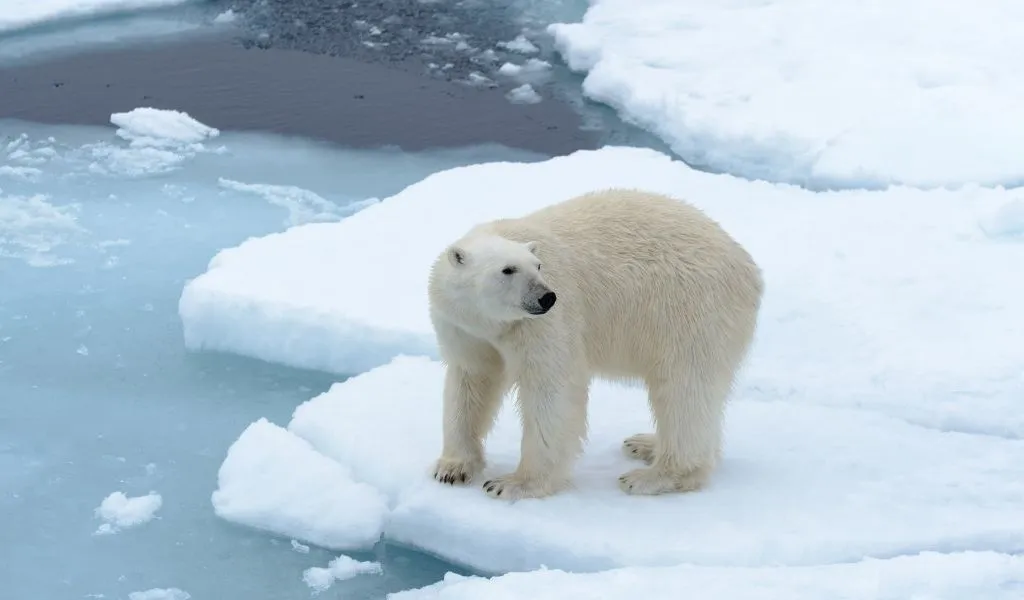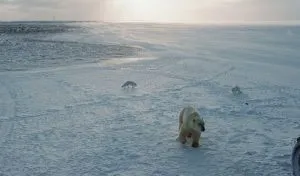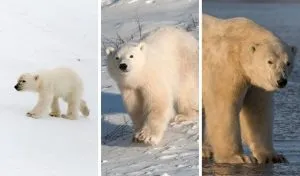There’s an old polar bear joke poem that goes, “If it’s brown, lay down. If it’s black, fight back. If it’s white, goodnight”. But, just how true is this? Do polar bears hunt humans?
Happy and well-fed polar bears do not hunt humans for food and usually avoid confrontation. There were just 73 attacks on humans between 1870-2014 which makes them very rare. However, young malnourished male polar bears are more likely to hunt humans for food.
Although rare now, predatory attacks by polar bears are something to watch out for in the future as melting sea ice might see more malnourished bears in human-occupied areas during summer.
Keep reading to find out more about human-polar bear interactions and how you can stay safe in the Arctic.
Do Polar Bears Hunt Humans?
Watch the video version of this article here where we bust 6 polar bears myths, or scroll down to keep reading:
No, polar bears do not hunt humans. They live off a diet of seals which they hunt on the Arctic sea ice during winter.
Most polar bears will aim to avoid confrontation with humans. If you are in the Arctic and spot a polar bear, making loud noises such as starting an engine or shouting loudly will often be enough to deter them from approaching you1 (source: Polar Bears in Svalbard, Norweigan Polar Institute, 2005).
Between 1870–2014, there have been a reported 73 attacks on humans by polar bears across the entire range that they occupy. This includes Canada, Greenland, Norway, Russia, and the United States.
Of the 73 attacks, 63 resulted in human injuries and 20 people were killed2 (source: Wildlife Society Bulletin, J. M. Wilder, Vol 41, Issue 3, 2017).
The study found that nutritionally stressed adult male polar bears were the most likely to cause harm to humans.
In the late part of the 20th century, Inuit populations accounted for the most interactions with polar bears (63%) followed by settlements of at least 50 people (18%) and industrial sites such as mines (15%)3 (source: Arctic, G.B. Stenhouse et al, Vol 41, No.4, 1968). However, the increase of tourism in the Arctic has likely changed the breakdown.
Why Do Polar Bears Hurt Humans?
In another study that looked specifically at national parks in Canada over a 20 year period, it was found that 14 people were non-fatally injured and 6 died as a result of attacks from polar bears4 (source: Bears: Their Biology and Management, S. Herrero and S. Fleck, Vol 8, 1989).
The study looked at the reasons why they attacked and the sex of the bears which overwhelmingly suggested male polar bears are responsible for the attacks and usually in pursuit of prey.
During these attacks, 5 polar bears consumed parts of their victims. During all of the attacks by male polar bears, only 1 stopped the attack on its own accord.
| Male | Female | Unknown | |
|---|---|---|---|
| Predatory attacks | 13 | 1 | 1 |
| Defense of young | 3 | ||
| Both | 1 | ||
| Unknown | 1 |
Do Polar Bears Eat Humans?
No, polar bears do not normally eat humans. Their diet consists of seals and other marine mammals in winter which they hunt from the sea ice.
During summer, when they move to the mainland or Arctic islands, they will top up on terrestrial mammals and often berries and plants too.
However, polar bears are considered to be opportunistic hunters, this means they will consume anything that comes their way when their main food is scarce.
As outlined earlier, there have been predatory attacks on humans by polar bears which have resulted in polar bears eating parts of their victims. These are usually by malnourished male polar bears and occur during summer when their fat reserves are lowest5 (source: Wildlife Society Bulletin, J. M. Wilder, Vol 41, Issue 3, 2017).
Can Polar Bears Smell Humans?
Yes, polar bears have an excellent sense of smell that can detect prey, including humans, up to 32km (20 miles) away6 (source: Polar Bears, S. Markle, 2004).
This shouldn’t raise concern as they do not go out of their way to hunt humans and will rarely even approach you.
However, if you are visiting the Arctic, you do need to be mindful of other smells that may attract them. For example, when cooking or storing food.
How to Stay Safe
Here are some tips to avoid attracting polar bears when camping in regions they inhabit:
- Choose your campsite carefully – polar bears are more common near the shoreline so choose a location far from shore.
- Keep your food in sealed containers – this reduces any odors that might attract polar bears (or other bears).
- Avoid cooking in tents – when cooking in tents, smells linger for much longer.
- Stay in large groups – the majority of polar bear-human attacks involved less than 2 people.
Source: Norweigan Polar Institute
How Climate Change is Impacting Polar Bear Attacks on Humans
Polar bears eat most of their food in the winter when they hunt seals on the Arctic sea ice. When the sea ice melts in summer, they move to the mainland or Arctic islands.
During winter, they build up their fat deposits which provide energy for them during the summer months when they cannot hunt seals.
However, climate change is causing the sea ice to melt earlier each year which gives the polar bears less time to build up their fat reserves ready for the summer.
Scientists are concerned that this could result in more nutritionally deficient polar bears in the summer months7 (source: Wildlife Society Bulletin, J. M. Wilder, Vol 41, Issue 3, 2017).
For example, in Canada, more interactions have already been observed between polar bears and humans during years when the sea ice melted earlier8 (source: Ursus, D. Clark, Vol. 14, No. 1, 2003).
In more recent years since the studies quoted in this article have been published, there are increased occurrences of unprovoked attacks on humans including a man who was picking berries with his children six miles outside an Inuit community in Canada9 (source: As Polar Bear Attacks Increase in Warming Arctic, a Search for Solutions, G. Dickie, 2018).
There is growing tension between those who want to protect polar bears and those who want to prevent such attacks.
Related Questions
How Common Are Polar Bear Attacks?
Polar bear attacks are very rare, between 1870-2014 there were just 73 attacks on humans by polar bears which resulted in 20 deaths.
How Big is a Polar Bear Compared to Humans?
An average male polar bear is about 1.5 times taller than a male human and over 5 times heavier. When stood on their hind legs, a polar bear can be up to 3m (10′) tall and would tower above a human.
The average size of a polar bear male is between 2.4-3m (8-10 feet) in length and weighs 350-680kg (775-1500lbs)10 (source: The Polar Bear, A. Hemstock, 1999). By contrast, an adult male American is 1.75m (5’9”) tall11 (source: Healthline) and weighs 90kg (198lbs)12 (source: Healthline).
What Do Polar Bears Eat?
Polar bears are carnivores with their preferred diet being marine mammals. They mainly eat ringed seals, closely followed by bearded seals and beluga whales13 (source: Polar Biology, M. P. Galicia, et al, Vol 38, Issue 12, 2015).
They will eat most of their food in winter to build up their fat reserves which they can convert into energy during summer when the sea ice melts and they have to move to the mainland or groups of islands in the Arctic.
During summer, they will top up with birds, terrestrial mammals such as caribou, and even plants, berries, and algae14 (source: BMC Ecology, L. J. Gormezano and R. F. Rockwell, Vol 13, Issue 51, 2013), which leads to some people calling them hypercarnivores (an animal whose diet is at least 70% meat).
Can You Eat Polar Bears?
Turning the proposition on its head slightly, can humans eat polar bears? Yes, you can eat polar bear meat much like any other bear. However, it must be cooked well to ensure any trichinella parasites are killed as these can cause severe illness or death.
You must also avoid its liver which is so high in vitamin A that it can cause hypervitaminosis A, this is a deadly condition when you overdose on vitamin A.
Nonetheless, hunting polar bears is illegal in most Arctic countries unless you are from a native population, so the opportunity to eat it does not arise frequently.




![Read more about the article Can Polar Bears Swim? [Yes – Here’s How Far and Fast]](https://polarguidebook.com/wp-content/uploads/2021/08/Can-Polar-Bears-Swim-300x176.jpg)
